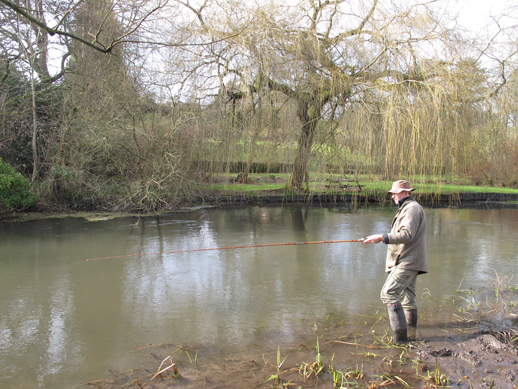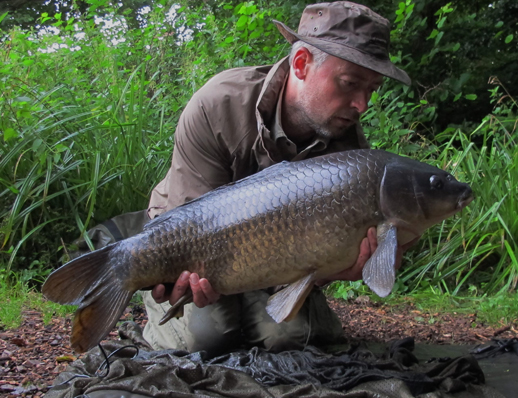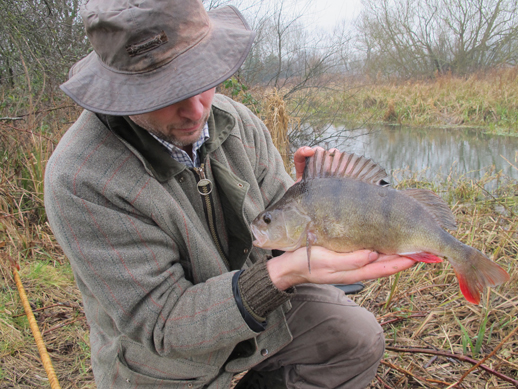Words and pictures: Jon Berry.
For most of my fisher-friends, March 14th means little. This year it was a wet, wintery Thursday that resembled so many of the days we have had of late. It was singularly unremarkable. For me, however, March 14th always signals the end of the coarse fisherman’s season, though any sense of closure, of reeling in and reflecting, is a false one. So many lakes now open all year round, and so many are happy to fish them, that I feel like the solitary protester, standing invisibly with placard and raincoat while the world continues around him. Even the rivers are still busy – with poachers who care little for tradition, and others who continue their casting with loophole excuses about fishing for eels or shad. Observing the traditional season, as I do, feels a little hollow. But it feels a little righteous too and so I will keep on doing so.
I enjoy the chance to pack away my rods, to cast backwards in my mind and remember. As the nets dry out in the shed and the reels sit on their shelf awaiting their annual oil change, it is memories that are my company. And memories, good and bad, are all we are really fishing for.
Back in June, I began the season thinking only of carp; I haven’t done so for many years but the chance to fish a special place arose and I found that I couldn’t say no. The Priory Pool is one of the last waters where proper Leney King Carp can be found. Only an angler would know that these fish are special. Leneys are a Germanic strain, brought to England in the first half of the twentieth century by the man who gave them their name. They grow very large, which is part of their attraction, but it is their beauty and scarcity that are especially prized. Anyone who has cast a line for them will know, too, that they are possessed of a wise cunning. I was aware before I started that catching one would be an exercise in perseverance, patience and stealth. I knew I would need some luck, too.
My efforts began when the season opened, but it was August before I got a bite. That didn’t matter. The Priory Pool proved to be a remarkable place, set in a quiet and beautiful valley where conventional human parameters like time and logic held little sway. It is an indictment of modern living that anywhere without artificial light or road noise takes on this sense of unreality, but the feeling is magical all the same and the Priory’s spell was stronger than most.
If it was magical, and it felt so, it was strange too. On my first night at the pool a young woman in dreadlocks and Doc Martens walked down from the woods on the west bank as the sun dipped behind the trees, serenely unaware of her bivouacked audience, and bellowed arias in to the darkness. No matter what anyone might tell you, such an event is unusual on the banks of a carp pool. When she disappeared, it was hard to believe she had been there at all, but the joint butts she left smouldering on the dam wall and a lingering falsetto in my head confirmed it to be so.
There were to be no repeats of this performance, but by July I had come to recognise the owls that called to one another and the muntjac and badgers which came down to forage on the far bank at dawn. One morning, as I drove out of the estate, a wild boar scurried alongside me before diving in to the undergrowth. Finally, and most remarkably of all, I saw a carp.
It was a common carp, an old fully-scaled fish with flanks that went from butter to bronze and then to inky black. I caught her on a grain of maize, three feet from the bank as the sun rose, and she weighed a little under twenty pounds – an unremarkable weight in these days of imported, intensively-reared fish, but in Leney’s time she would have been a giant. I grappled with the self-timer and took her portrait and, looking back now at the photograph, I remember the sleep-deprived fug and bewilderment of the moment, rendered so accurately in its pixels. I drove home singing a few arias of my own.
If the Priory’s illusory appeal was one of timelessness, it suited me just fine. When summer broke I was, for the first time in my life, out of work. I won’t dwell on my redundancy – I have written about it here before, and reading about it again would be as tiresome to you as remembering it is to me – but it meant that I could choose days with warm south-westerlies, gathering clouds and the promise of rain. Days when the fish might be hungry. Time, for a while at least, was driven only by feeding patterns and the vagaries of the weather. It felt good to let these things dictate the day, instead of timetables and school bells.
I fished on for carp until autumn arrived – sometimes at the Priory but also at two secret lakes to which I received invitations. One sat high above Savernake forest, the other in a deep West Country valley, and both opportunities came with an understanding that they would never be mentioned in a medium such as this. I can say only that I was fortunate at both places, that I landed the biggest wild carp I have ever seen, and that the memories I have of both waters are among my favourite secrets.
In October, I visited the Kennet with a band of friends for our annual gudgeon match, a social non-competition between old pals where the capture of England’s humblest fish is accompanied by tea, cake and the easy humour of those who have known one another for a long time. My own contribution to the cause was poor; the weir pool in which I found myself is famed for big barbel and I abandoned all thoughts of gobio and cast a stronger line. When the bite came the barbel weighed four pounds rather than fourteen, but it fought well under the white water of the lasher and prompted my immediate expulsion from the match – just as I had hoped it would.
Weeks later, I spent a day on the Lower River Severn at Pixham Ferry. It’s a famous old beat and some of its best pitches – the Lightning Tree, the Green Door – are famed among devotees of old whiskers. The morning was quiet but by mid-afternoon a weak sun had done enough to warm the depths and the barbel appeared, grubbing among dying weed stems for food. I caught three to nine pounds and lost another that felt a little bigger, just as the light went. Five months on, it is the last of these that has left the clearest memory. The lost ones usually do.
We moved to the Cotswolds as winter arrived – I’ve written about that here, too – and hunkered down for four months as floods, and then snow, claimed the flat, lime-rich landscape of the water park. I fished less than is usual for me, sneaking an occasional pike from the pits and perch from a Thames tributary in brief moments when the elements were more forgiving, but those memories were subsumed by an overwhelming sense of impatience; I’d ended up in a quiet corner of England where the fishing is as plentiful as it is spectacular, but every lake and stream ran high and coloured and the fish simply sheltered from the deluge, appetites lost.
It was only in the final week of the season that some semblance of order was restored. I caught grayling from the Itchen and perch and chub from the Thames, and took part in a day’s filming with a television company on the banks of the Kennet. The crew – young, keen, non-anglers to a man – were shooting a pilot for what they hope will be a suitably eccentric fishing programme, and asked if I might catch a two pound perch for the camera. The river was back within its banks, carrying a temperature and colour appropriate for late-winter, and I managed this, twice, in an hour. The bigger of the two weighed close to three pounds and fought well, displaying a bristling confidence in front of the camera that I did not. If the project comes to nothing (as I suspect it might) I at least have the memory of a day when fortune triumphed over skill.
For this hapless fisherman, those are the best memories of all.


